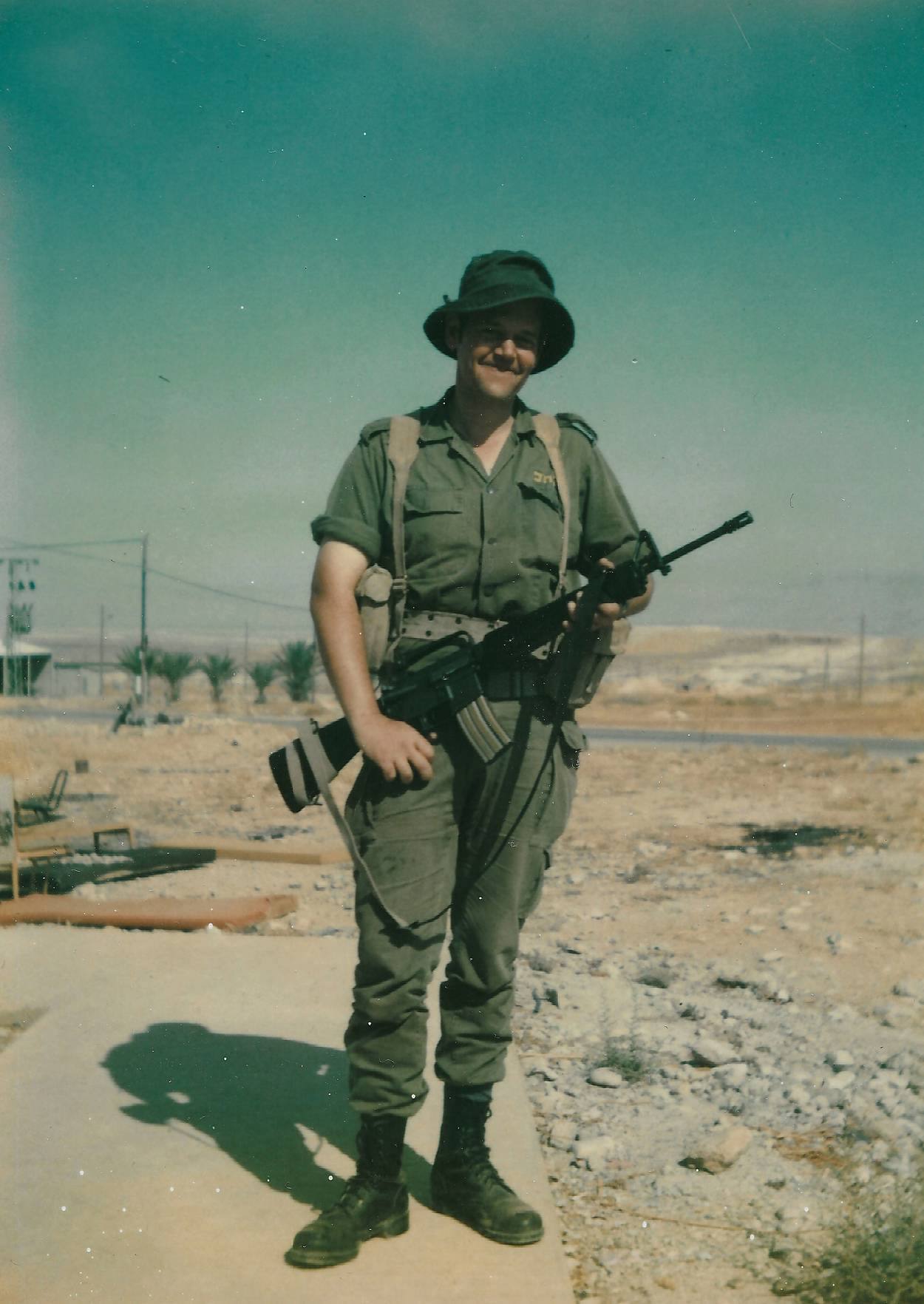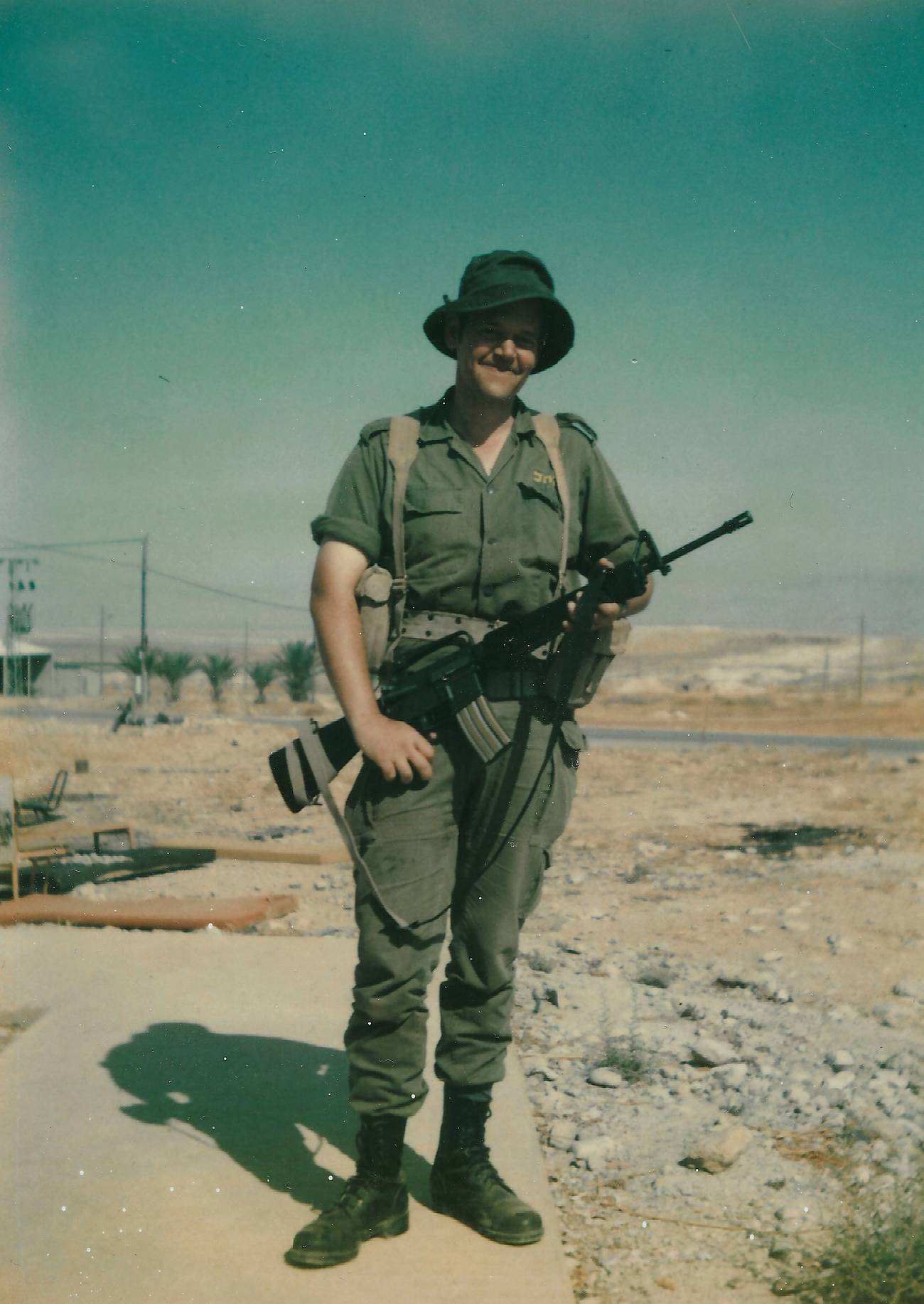Basic Training
How a small group of Georgian Jews won a minor victory over the Israeli army




While living on a kibbutz, I was drafted, and began tironut (basic training) in November 1974 on a military base somewhere on the West Bank, the territory captured from Jordan during the Six-Day War.
At that time, 18-year-old Israeli men would serve for three years, including basic training; 18-year-old women, two years.
My basic training group consisted entirely of immigrants, most from Russia, Georgia, and Kazakhstan in the Soviet Union, but some from Romania, and a scattering from Western countries, such as France, South Africa, England, Turkey, and the United States (me). We were to do four months of basic training and then become part of the IDF reserves.
From the beginning, the combination of 18- and 19-year-old Israeli noncommissioned officers and lieutenants giving orders to men old enough to be their fathers or, in at least one case, an actual grandfather at 48, seemed destined to end badly. I was the “baby” of the group at 32.
As troubling as the age differences, even worse, some of the trainees, especially those from the Soviet Union, had served in the military in their previous countries. One man going through basic training with us had been a captain in the Red Army. Again, these army veterans were being given orders by kids.
In addition, some of the men knew very little Hebrew, to the point that when orders were given in Hebrew, one soldier would stand in the front of the troops and translate the orders into Russian.
To understand the extent of the language problems, about a week after basic training began, two Kazakhstani Jews, who were among the 15 or so people sharing the tent with me, asked me if I was a sabra (a native Israeli). Anyone who would ask such a question knew virtually no Hebrew. In 1974, my Hebrew still was rudimentary and what I knew, I spoke, and still speak, with a pronounced American accent, easily recognizable by Hebrew speakers. Even when my Hebrew-speaking skills were meager, I still easily could detect a Russian, or American, accent.
The two Kazakhstani men, who worked in factories, had not had the same chance I had, as a college graduate, to study Hebrew for several months on a full-time, subsidized basis.
The thinking behind this discriminatory policy was that academics needed language to make a living and had to be given help in learning Hebrew, while ordinary laborers, to whom language was less important, were expected to begin working soon after their arrival and to learn in free ulpanim in the evenings.
There may have been some justification for the policy, but it nonetheless was grossly unfair.
In basic training, we learned to march and salute, which were activities of little use in the informal IDF we were preparing to join. We were taught to fire the Belgian FN rifle and the Uzi submachine gun. And we learned to spit-shine our boots.
One of the scarier activities was throwing hand grenades. The lieutenant would take us, one soldier at a time, about 30 yards away from the group. The two men would lie down behind a barrier, and the soldier would throw the grenade. Sometimes, the frightened and confused trainee would merely drop the grenade on the other side of the low wall, the presence of which saved the two soldiers from injury.
We slept in large tents out of doors in the chilly night air inside sleeping bags and under a blanket. Our equipment, which we had signed for, was stored in kit bags underneath the beds.
The real friction between officers and soldiers occurred during the many inspections that took place. The men would be told that an inspection would occur at a determined time, and the inspection would include the condition of the beds and the equipment underneath. The soldiers needed to be cleanshaven, their boots polished and their rifles clean.
Every inspection saw the same order of arrival outside the tent where it would begin. First, came the Westerners, then the Russians, Romanians, and Kazakhstanis. Many Georgians came late. This pattern continued over many days, despite the many exhortations by the corporal (who was 18 or 19 years old) that soldiers needed to be prompt when carrying out an order.
Finally, the frustrated corporal announced that at the next inspection, he would write down the names of those who were tardy, and the latecomers would not be allowed to go home the following Shabbat—a severe punishment for the men, almost all of whom had wives and children waiting for them at home.
The next inspection produced the usual outcome, and the corporal made good on his threat.
After the inspection, the Georgians (Gruzinim, in Hebrew) huddled together, and then they announced that in protest, there would be a strike the next time we were ordered to do something, and we had all better go along with the plan. But we’re soldiers in the army, we replied, we can’t strike. In answer, our Georgian interlocutor moved his index finger across his neck, mimicking a knife slitting a throat. We got the message.
A few minutes later, the corporal showed up again, this time to march us to the dining hall for lunch. We all lined up for the march, and the corporal said, “Yemina p’ne” (“right face”). No one moved. He repeated the order. Again, nothing.
I still remember the look of bewilderment and frustration on the young man’s face as he realized what was happening and went to get help.
A few minutes later, our commanding officer—a second lieutenant appearing to be, at most, 22 years old—came to talk to us. We were soldiers and had to obey commands, he said. But Zahal (the Hebrew acronym for the IDF) understands how difficult it is for immigrants not familiar with Hebrew and local customs. So, this time, the punishment was being rescinded.
Now, he said, let’s march to lunch. Of course, we complied.
So, a tiny group of mostly uneducated Jews from a small mountain republic in the Soviet Union had whipped the mighty Israeli army.
Excerpted from Figs and Alligators: An American Immigrant’s Life in Israel in the 1970s and 1980s. Aaron Leibel, © 2021. Reprinted courtesy of Chickadee Prince Books.
Aaron Leibel is a veteran journalist who writes regularly for The Jerusalem Post and Washington Jewish Week newspapers.